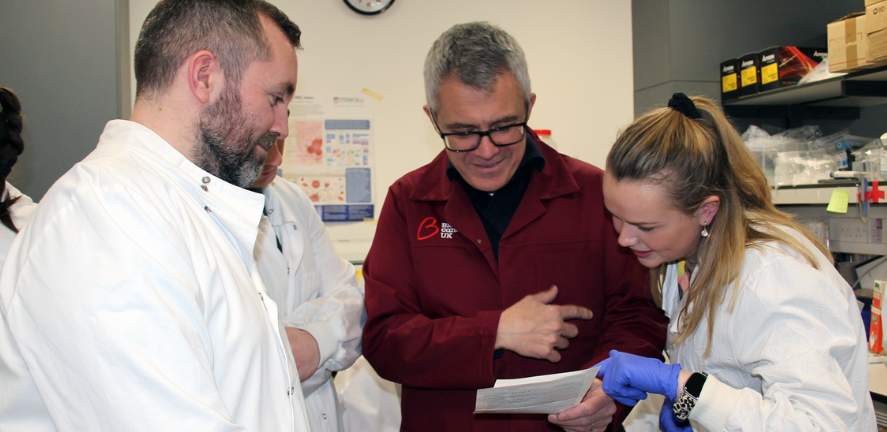
Submitted by Laura Puhl on Mon, 05/02/2024 - 10:48
On World Cancer Day yesterday (4 February), Blood Cancer UK and the American charity Leukemia & Lymphoma Society (LLS) announced the start of a transformative five-year, £4 million research project in Cambridge, spearheaded by CSCI’s Professor George Vassiliou. The project aims to establish a clinical platform to identify individuals at high risk of certain blood cancers and develop interventions to prevent them from progressing to these diseases.
Professor George Vassiliou from the Wellcome-MRC Cambridge Stem Cell Institute (CSCI) and University of Cambridge will focus the project on myeloid blood cancers, a group of cancers that accounts for more than 11,000 deaths each year in the UK. The blood cancers, which affect both the bone marrow and blood, include acute myeloid leukaemia (AML), myelodysplastic syndromes (MDS), myeloproliferative neoplasms (MPN) and rarer cancers like chronic myelomonocytic leukaemia (CMML).
George Vassiliou said, “One of the crucial parts of this project is the establishment of a specialised clinical network, where patients at high risk of developing myeloid blood cancers, will undergo an in-person visit, followed by remote or virtual follow-up visits. The virtual element to the programme will be important for scaling up blood cancer prevention to a national level, in collaboration with leading NHS hospitals/specialists, something we expect to establish over the next few years.”
While many of the myeloid blood cancers currently don’t have a cure, previous work from Professor Vassiliou’s team and their collaborators revealed that many people at high risk of developing these blood cancers can be identified years in advance. In this new project, researchers will develop a screening system to identify, at scale, people at high risk of myeloid blood cancers and develop strategies to prevent these diseases from developing in the first place.
In parallel, planned laboratory experiments will identify the mechanisms involved in progression towards these blood cancers and ways to stall or reverse them. Crucially, the project will also build, at Cambridge University Hospitals, the clinical infrastructure to facilitate implementation and testing of clinical interventions in those at high risk.
Speaking about the funding, Blood Cancer UK's Director of Research Dr Rubina Ahmed, said, "Blood cancer is the UK’s third biggest cancer killer, so this world-leading programme to transform our understanding of myeloid blood cancers and help us develop effective prevention strategies is much needed. Prevention into solid cancers that form tumours is an advanced area of research and clinical practice, but we’re simply not at that stage with blood cancers yet. So we’re pleased to work together with another international funder and scientists in world leading research institutes, to beat blood cancer in a generation.”
Dr Lee Greenberger, Chief Scientific Officer at the Leukemia & Lymphoma Society said, “We want to improve outcomes and quality of life for patients affected by these challenging blood cancers. This funding collaboration between Blood Cancer UK and the Leukaemia and Lymphoma Society marks a significant stride towards advancing research, treatment, and prevention strategies for myeloid blood cancers on an international scale.”

